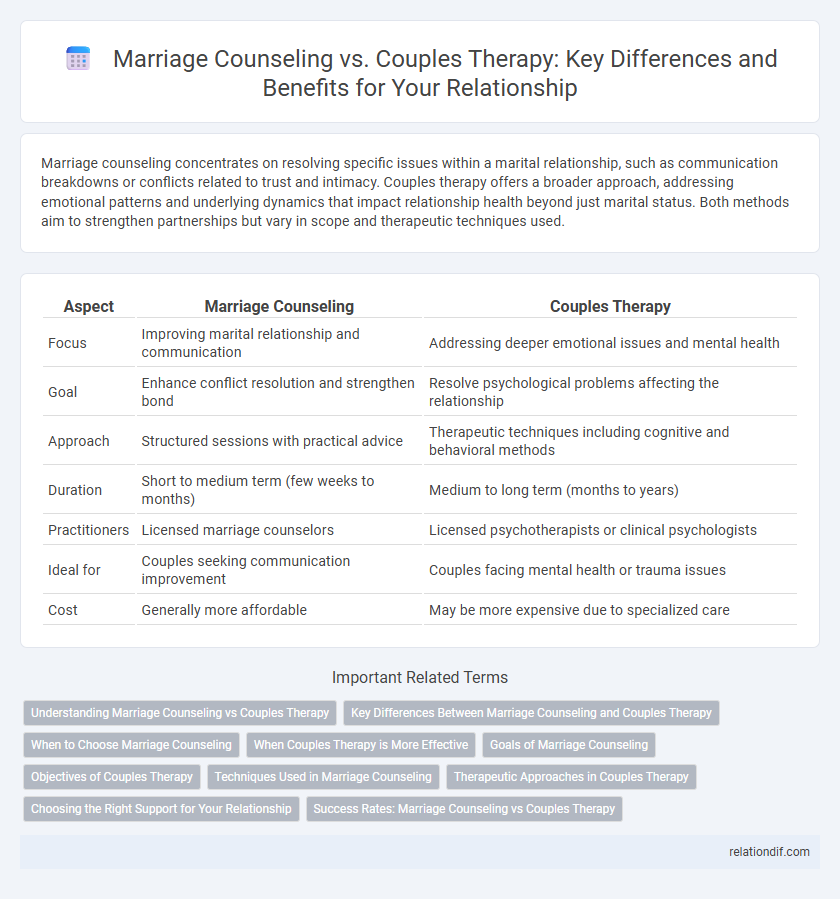Marriage counseling concentrates on resolving specific issues within a marital relationship, such as communication breakdowns or conflicts related to trust and intimacy. Couples therapy offers a broader approach, addressing emotional patterns and underlying dynamics that impact relationship health beyond just marital status. Both methods aim to strengthen partnerships but vary in scope and therapeutic techniques used.
Table of Comparison
| Aspect | Marriage Counseling | Couples Therapy |
|---|---|---|
| Focus | Improving marital relationship and communication | Addressing deeper emotional issues and mental health |
| Goal | Enhance conflict resolution and strengthen bond | Resolve psychological problems affecting the relationship |
| Approach | Structured sessions with practical advice | Therapeutic techniques including cognitive and behavioral methods |
| Duration | Short to medium term (few weeks to months) | Medium to long term (months to years) |
| Practitioners | Licensed marriage counselors | Licensed psychotherapists or clinical psychologists |
| Ideal for | Couples seeking communication improvement | Couples facing mental health or trauma issues |
| Cost | Generally more affordable | May be more expensive due to specialized care |
Understanding Marriage Counseling vs Couples Therapy
Marriage counseling and couples therapy both aim to improve relationship dynamics but differ in scope and methodology. Marriage counseling typically focuses on resolving specific marital issues, communication problems, and conflict resolution between spouses. Couples therapy offers a broader approach, addressing emotional intimacy, individual behaviors, and overall relationship health for diverse types of partnerships.
Key Differences Between Marriage Counseling and Couples Therapy
Marriage counseling primarily targets married couples facing specific marital issues such as communication breakdown, infidelity, or conflict resolution, often focusing on saving or improving the marriage itself. Couples therapy, however, is broader, addressing relational dynamics between partners regardless of marital status, including dating, cohabitating, or long-term partners, and often explores deeper emotional or psychological patterns. The key difference lies in marriage counseling's focus on the legal or formal marital bond, while couples therapy concentrates on the overall relational health and individual growth within the partnership.
When to Choose Marriage Counseling
Marriage counseling is ideal when couples face specific issues such as communication breakdowns, conflict resolution, or pre-marital preparation, aiming to strengthen their relationship foundation. This approach focuses on practical strategies to improve marital satisfaction and prevent future problems. Choose marriage counseling when the goal is to address immediate relationship concerns and foster healthier interactions before they escalate.
When Couples Therapy is More Effective
Couples therapy is more effective when partners face ongoing communication breakdowns, unresolved conflicts, or emotional disconnection that hinders intimacy. Trained therapists utilize specialized techniques to address deep-seated relational patterns and foster empathy, trust, and mutual understanding. This approach often leads to stronger emotional bonds and improved conflict resolution skills within the marriage.
Goals of Marriage Counseling
Marriage counseling primarily focuses on improving communication and resolving specific conflicts between partners to restore harmony and strengthen the marital bond. It aims to address practical issues such as trust, intimacy, and problem-solving strategies, helping couples develop healthy patterns for long-term relationship success. Goals typically include fostering emotional connection, enhancing mutual understanding, and promoting commitment to shared life objectives.
Objectives of Couples Therapy
Couples therapy primarily aims to improve communication, resolve conflicts, and rebuild trust between partners, fostering emotional intimacy and mutual understanding. It addresses underlying issues such as attachment styles, emotional regulation, and relational patterns that contribute to relationship distress. By focusing on behavioral changes and emotional connection, couples therapy helps partners develop healthier interaction habits and strengthen their bond.
Techniques Used in Marriage Counseling
Marriage counseling employs evidence-based techniques such as cognitive-behavioral therapy, emotion-focused therapy, and communication skill-building exercises to help couples resolve conflicts and improve intimacy. Therapists often use active listening and role-playing to enhance mutual understanding and foster emotional connection. These structured interventions aim to address specific issues within the marriage by promoting healthier interaction patterns and conflict resolution strategies.
Therapeutic Approaches in Couples Therapy
Couples therapy employs a variety of therapeutic approaches such as Emotionally Focused Therapy (EFT), Cognitive Behavioral Therapy (CBT), and the Gottman Method to address relational dynamics and improve communication patterns. These evidence-based techniques target emotional attachment, cognitive distortions, and behavioral interactions to foster intimacy and resolve conflicts. Marriage counseling often centers on problem-solving and communication skills, while couples therapy integrates deeper psychological processes and systemic relationship patterns.
Choosing the Right Support for Your Relationship
Marriage counseling and couples therapy both aim to improve relationship dynamics but differ in scope and approach. Marriage counseling typically focuses on resolving specific conflicts, communication issues, and strengthening marital bonds, often guided by licensed marriage and family therapists. Couples therapy addresses broader emotional patterns, individual psychological factors, and relational growth, making it suitable for partners seeking deep emotional healing and long-term relationship development.
Success Rates: Marriage Counseling vs Couples Therapy
Marriage counseling typically achieves success rates ranging from 70% to 80%, emphasizing conflict resolution and communication improvement for married couples. Couples therapy, which supports a broader range of relationships beyond marriage, shows success rates of approximately 65% to 75%, focusing on emotional connection and behavioral changes. Both approaches benefit from early intervention, skilled therapists, and client commitment, significantly influencing their effectiveness in relationship improvement.
Marriage Counseling vs Couples Therapy Infographic

 relationdif.com
relationdif.com